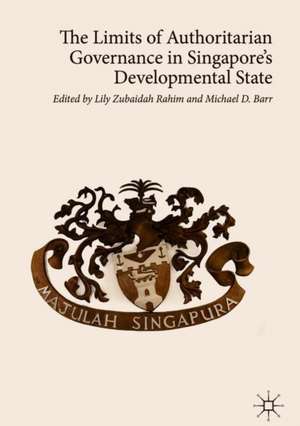The Limits of Authoritarian Governance in Singapore's Developmental State
Editat de Lily Zubaidah Rahim, Michael D. Barren Limba Engleză Hardback – 25 feb 2019
Preț: 691.98 lei
Preț vechi: 864.98 lei
-20% Nou
Puncte Express: 1038
Preț estimativ în valută:
132.43€ • 143.80$ • 111.24£
132.43€ • 143.80$ • 111.24£
Carte disponibilă
Livrare economică 02-16 aprilie
Livrare express 18-22 martie pentru 34.96 lei
Preluare comenzi: 021 569.72.76
Specificații
ISBN-13: 9789811315558
ISBN-10: 9811315558
Pagini: 324
Ilustrații: XXIII, 329 p. 3 illus.
Dimensiuni: 148 x 210 x 27 mm
Greutate: 0.59 kg
Ediția:1st ed. 2019
Editura: Springer Nature Singapore
Colecția Palgrave Macmillan
Locul publicării:Singapore, Singapore
ISBN-10: 9811315558
Pagini: 324
Ilustrații: XXIII, 329 p. 3 illus.
Dimensiuni: 148 x 210 x 27 mm
Greutate: 0.59 kg
Ediția:1st ed. 2019
Editura: Springer Nature Singapore
Colecția Palgrave Macmillan
Locul publicării:Singapore, Singapore
Cuprins
1. Introduction: Authoritarian Governance in Singapore’s Developmental State.- 2. Singapore and the Lineages of Authoritarian Modernity in East Asia.- 3. Independence: The Further Stage of Colonialism in Singapore.- 4. Albert Winsemius and the Transnational Origins of High Modernist Governance in Singapore.- 5. Social Policy Reform and Rigidity in Singapore’s Authoritarian Developmental State.- 6. New Politics and Old Managerialism: Welcome to the New Normal.- 7. Intra-Party Dynamics in the People’s Action Party: Party Structure, Continuity and Hegemony.- 8. The Growing Challenge of Pluralism and Political Activism: Shifts in the Hegemonic Discourse in Singapore.- 9. PAP Vulnerability and the Singapore Governance Model: Findings from the Asian Barometer Survey.- 10. Aligning Media Policy with Executive Dominance.- 11. Pragmatic Competence and Communication Governance in Singapore.- 12. Legislating Dominance: Parliament and theMaking of Singapore’s Governance Model.- 13. Governing Authoritarian Law: Law as Security.- 14. Conclusion: Democratising Singapore’s Developmental State.
Notă biografică
Lily Zubaidah Rahim is an Associate Professor of Government & International Relations at the University of Sydney and a specialist in authoritarian governance, democratisation, ethnicity and political Islam. Her books include The Singapore Dilemma: The Political and Educational Marginality of the Malay Community, (1998), Singapore in the Malay World: Building and Breaching Regional Bridges (2010), Muslim Secular Democracy (2013), and The Politics of Islamism (2018). Lily Zubaidah is currently President of the Malaysia and Singapore Society of Australia (MASSA) and Vice-President of the Australian Association of Islamic and Muslim Studies.
Michael Barr is an Associate Professor of International Relations in the College of Business, Government and Law at Flinders University. His books include Lee Kuan Yew: The Beliefs behind the Man (2000 ), Constructing Singapore: Elitism, Ethnicity and Nation Building (2008),The Ruling Elite of Singapore (2014) and Singapore: A Modern History (2018). He was Editor-in-Chief of Asian Studies Review from 2012-2017.
Textul de pe ultima copertă
This book delves into the limitations of Singapore’s authoritarian governance model. In doing so, the relevance of the Singapore governance model for other industrialising economies is systematically examined. Research in this book examines the challenges for an integrated governance model that has proven durable over four to five decades. The editors argue that established socio-political and economic formulae are now facing unprecedented challenges. Structural pressures associated with Singapore’s particular locus within globalised capitalism have fostered heightened social and material inequalities, compounded by the ruling party’s ideological resistance to substantive redistribution. As ‘growth with equity’ becomes more elusive, the rationale for power by a ruling party dominated by technocratic elite and state institutions crafted and controlled by the ruling party and its bureaucratic allies is open to more critical scrutiny.Lily Zubaidah Rahim is an Associate Professor of Government & International Relations at the University of Sydney and a specialist in authoritarian governance, democratisation, ethnicity and political Islam. Her books include The Singapore Dilemma: The Political and Educational Marginality of the Malay Community, (1998) and Singapore in the Malay World: Building and Breaching Regional Bridges (2010), Muslim Secular Democracy (2013) and The Politics of Islamism (2018). Lily Zubaidah is currently President of the Malaysia and Singapore Society of Australia (MASSA) and Vice-President of the Australian Association of Islamic and Muslim Studies.
Michael D. Barr is an Associate Professor of International Relations at Flinders University. His books include Lee Kuan Yew: The Beliefs behind the Man (2000), The Ruling Elite of Singapore (2014) and Singapore: A Modern History (2018). He was Editor-in-Chief of Asian Studies Review from 2012-2017.
Michael D. Barr is an Associate Professor of International Relations at Flinders University. His books include Lee Kuan Yew: The Beliefs behind the Man (2000), The Ruling Elite of Singapore (2014) and Singapore: A Modern History (2018). He was Editor-in-Chief of Asian Studies Review from 2012-2017.
Caracteristici
Highlights the limitations of Singapore’s authoritarian governance model Examines the relevance of the Singapore governance model for other industrialising economies Elaborates on the structural pressures associated with Singapore’s particular locus within globalised capitalism that have fostered heightened social and material inequalities
